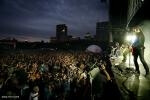Andrew Zaleski>Senior>English>Loyola University Maryland
Pat Mannion is strategizing. He, along with friends Stephen Wolff and Keith Traffican, are looking to book Philadelphia rap duo Chiddy Bang for a June music festival they’re organizing. The thing is, they’re all only college freshmen, with shallow pockets and no connections in the music industry. But, on June 18, Chiddy Bang paused their West Coast tour, hopped aboard a flight to Philadelphia in the morning, and were ready to take the stage at Summer 618 well in advance of the 10 p.m. start to their set.
Summer 618, billed as the first alternatively-powered major music festival in the Northeast, was the brainchild of Mannion, Wolff and Traffican. All students—Mannion is studying economics at Harvard, Traffican is at the University of Pittsburgh studying biology, and Wolff majors in entrepreneurship at Babson College—the three 19-year-olds came together under the name Power-Plant Productions and began planning the June concert back in February. (In June 2009, Wolff and Traffican put on their first music festival, Summer 619, at Snipes Farm in Morrisville, Pennsylvania. This summer, the three soon-to-be sophomores again made Snipes Farm the stage, but changed the festival name when they couldn’t lock up the June 19th date two years in a row.) Their efforts came to fruition June 18 when roughly 3,000 students, ranging in age from 15 to 24, descended upon Snipes Farm for a night of techno beats, DJ mixes, mashing, moshing, and enough fist pumping and dancing to shame the cast of Jersey Shore right out of their beach clubs.
For about five hours beginning at 6 p.m., a slew of DJs and mash-up artists, including blogosphere sensation 5 & a Dime, played to the crowd on the lower pasture of 150-acre Snipes Farm. Those in attendance were treated to cheap food and drinks (sorry, no alcohol) and the ever-present risk of epileptic seizure from myriad, multi-colored strobe lights that riddled the stage. Following the lineup of DJs were L.A.-based Super Mash Bros., who, along with Chiddy Bang, blasted eardrum-defying sound for a solid hour as students screamed, jumped, danced and (sorry, mom and dad) “grinded” along.
“A lot of people didn’t know what to expect,” said Mannion. “But we had a lot of small groups from every different school.”
Following the main show’s ending at 11 p.m. was a VIP after-party held in a 60-foot diameter geodesic dome, which construction crews assembled just days before the festival. Students who splurged for the $40 VIP pass were able to extend the party past midnight with a fresh lineup of DJs, more eardrum-defying sound and an unexpected guest.
“Chiddy came to our after-party in the dome,” said Mannion. “Chiddy Bang was very cool—they thought the show was very cool.”
To promote the show, Mannion, Wolff and Traffican employed some 80 student-promoters, two in every high school in the Philadelphia area, plus promoters at their respective universities, not to mention Facebook and Twitter (at the time of Summer 618, the Facebook event page had more than 4,900 guests).
“It was taking everybody out to coffee, out to lunch, and getting people excited for the event,” said Mannion.
To make Summer 618 truly eco-friendly, the organizers used electronic ticketing exclusively, and had their ticket takers at the door deposit tickets into several recycling bins; biodiesel was used to run the generators that powered the stage and all the lighting; according to Mannion, organizers of these big festivals typically print upwards of 20,000 flyers, whereas the three of them printed only 10,000; and, finally, they encouraged carpooling by waiving the $5 parking fee if students came three or more in a car.
“This all started out as the three of us just doing things,” said Mannion. “There’s so much you don’t think about: venue cost, getting the artists, sound, lighting, security, dealing with permits, press—every once in a while, it hits me.”
Not to mention an event’s total cost, which, for Summer 618, clocked in at the “I’ll take a BMW with none of the upgrades” range.
And while some students might have seen such an obstacle as a deterrent to finding artists, admits Mannion, he maintains that there are always ways to work around the difficulties.
“Just pretend you’re a really rich dad throwing a Sweet 16 party for your daughter.”
Want to throw your own festival? Follow these tips from the Summer 618 organizers:
1. Contracted Venue: Get them to sign so no one backs out when they find out you’re only 20!
2. Low-cost Web phenom: Send an e-mail to the booking agent (can be found on MySpace or Web site) giving no more than date and location of your event and ask for a quote!
3. Sound and lighting: Find that tech kid who always dreamed of doing more than operating a spotlight, and send him to a rental warehouse with $200.
4. Promoter team: A solid group of 10-15 people who feel like they’re a part of organizing the event will do wonders. Every new person you bring on from a different social circle will have an exponential effect on your promotion effort. The key is instead of you going to your 150 friends, you spend your time having 20 people each go to their 150 friends.
5. Fake mustaches: You will need this to trick everyone into thinking that you’re actually at least 25 years old. Most booking agents and industry professionals are about 30 years old and love to take economic advantage of anyone younger. Remember that you’re running the show!
photo from http://aphs.worldnomads.com/travel-tips/17484/NIN_lollapallooza_USA.jpg



















